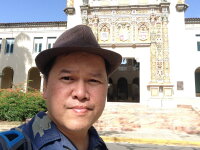
What counts as intellectual history? Who should be considered an intellectual? What is culture? Does the United States have a distinctive culture? A plurality? These are some of the most basic questions we ask as scholars of U.S. culture and intellectual life. We examine how the multiple and diverse identities that residents of the U.S. hold—including ethnicity, race, gender, class, religion, sexuality, and politics, among others --have shaped culture and intellectual life over the course of U.S. History.
This multi-perspectival approach leads us to consider a number of dimensions of U.S. cultural formation. We investigate the ways colonialism, imperialism, and globalization are entangled with U.S. cultural and intellectual history. We probe the transnational roots of U.S. cultural and intellectual history, as phenomena deeply marked by diasporic, borderlands, Atlantic World, Pacific Rim, and other connections. We also look at U.S. cultural and intellectual history in comparative context, alongside the histories of other states founded by European colonists. We consider where and when it is appropriate to understand cultural exchanges as imperialism or see them as cultural transfer. The history of capitalism and the political and cultural critiques it has provoked are also central themes. Ideas about nature, ecology and the environment are crucial to our work as well. So are the distinction and relation between streams of “high” and “popular culture and the ways they have informed one another.
These issues engage a dynamic group of faculty and students who focus on issues of U.S. cultural and intellectual history at the University of Illinois at Urbana-Champaign. We approach the field from a wide range of perspectives. We consider traditional intellectual and cultural history topics such as religion, literature, and science in light of more recent interrogations of the very categories of "culture" and "intellect." We borrow from the insights of scholars in related fields of anthropology, sociology, literary criticism and economics. We also consider cultural and intellectual life through the lenses of ethnic studies, critical race theory, and postcolonial theories, feminist theory, queer theory, disability studies and environmental studies. We are engaged with cultural studies focusing on popular cultures and their reception; material culture and its uses. We investigate culture as a field of contest, analyze diverse forms of cultural work, and research cross-cultural contact within and outside the borders of the United States.
In our research and courses we examine a myriad of topics and sources related to these themes. These include, to name a few: photography and the body; quilts and Agent Orange; plumbing and company town; buffalo skins; magazines, documentary film, memorabilia; baseball cards; pigs and prairie grasses; dance halls and riots, activists lives and struggles for social justice. This range of scholarship and teaching interests provides multiple points of entry for students interested in the study of U.S. culture and intellectual life.
Students interested in comparative or transnational cultural history should consult Cultural and Intellectual graduate field of study, which provides information on faculty members specializing in cultural history in other parts of the world.
Campus Resources
- Department of African American Studies
- American Indian Studies Program
- Department of Anthropology
- Graduate Program in Art History, School of Art and Design
- Department of Asian American Studies
- Department of English
- Department of Gender and Women's Studies
- Humanities Research Institute
- Institute of Communications Research
- Department of Landscape Architecture,
- Department of Latina/Latino Studies
- Unit for Criticism and Interpretive Theory







